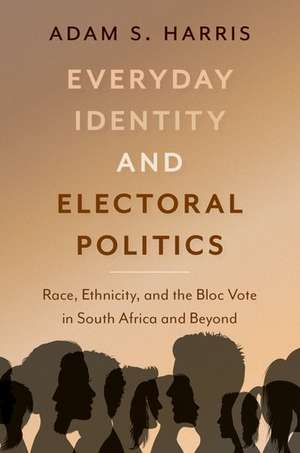Everyday Identity and Electoral Politics: Race, Ethnicity, and the Bloc Vote in South Africa and Beyond
Autor Adam S. Harrisen Limba Engleză Hardback – 4 oct 2022
Preț: 397.94 lei
Preț vechi: 432.55 lei
-8% Nou
Puncte Express: 597
Preț estimativ în valută:
76.17€ • 82.77$ • 64.02£
76.17€ • 82.77$ • 64.02£
Carte disponibilă
Livrare economică 31 martie-14 aprilie
Livrare express 15-21 martie pentru 32.47 lei
Preluare comenzi: 021 569.72.76
Specificații
ISBN-13: 9780197638200
ISBN-10: 0197638201
Pagini: 264
Ilustrații: 38 B&W line drawings
Dimensiuni: 229 x 150 x 28 mm
Greutate: 0.5 kg
Editura: Oxford University Press
Colecția OUP USA
Locul publicării:New York, United States
ISBN-10: 0197638201
Pagini: 264
Ilustrații: 38 B&W line drawings
Dimensiuni: 229 x 150 x 28 mm
Greutate: 0.5 kg
Editura: Oxford University Press
Colecția OUP USA
Locul publicării:New York, United States
Recenzii
In this important book, Adam Harris develops a novel theory of how ethnic attributes shape attachments to identities with implications for political behavior. He rigorously scrutinizes his theory using a range of original experimental and observational approaches, which are ultimately compelling. In turn, Everyday Identity and Electoral Politics simultaneously contributes to scholarly literatures on comparative ethnic politics and to our understanding of racial politics in the important South African case.
Harris deftly moves us beyond binaries of 'co-ethnic' and 'non-coethnic', developing a nuanced concept of ethnic distance, to understand political behavior in diverse societies. Through a rich, multi-method study around the 2014 South African elections, as well as evidence from the United States and Uganda, Harris's must-read book elevates literatures on ethnic politics to new theoretical and empirical heights.
In an exciting twist to the co-ethnic voting literature, Harris argues for the importance of 'everyday' interactions in shaping political behavior. Individuals who look different from the group norm vote against the group norm and do so because other group members treat them differently. Required reading for anyone interested in the microfoundations of ethnic voting.
Adam Harris has produced an impressive study that takes us beyond conventional wisdom in understanding how ethnic and racial identities shape political preferences. Based on insightful theorizing and original empirics, Harris provides a nuanced depiction of identity construction and how it differentially affects people's everyday life experiences. This book offers profound insights for anyone who seeks to understand the complex impact of race or ethnicity on political behavior in diverse societies around the world.
Harris deftly moves us beyond binaries of 'co-ethnic' and 'non-coethnic', developing a nuanced concept of ethnic distance, to understand political behavior in diverse societies. Through a rich, multi-method study around the 2014 South African elections, as well as evidence from the United States and Uganda, Harris's must-read book elevates literatures on ethnic politics to new theoretical and empirical heights.
In an exciting twist to the co-ethnic voting literature, Harris argues for the importance of 'everyday' interactions in shaping political behavior. Individuals who look different from the group norm vote against the group norm and do so because other group members treat them differently. Required reading for anyone interested in the microfoundations of ethnic voting.
Adam Harris has produced an impressive study that takes us beyond conventional wisdom in understanding how ethnic and racial identities shape political preferences. Based on insightful theorizing and original empirics, Harris provides a nuanced depiction of identity construction and how it differentially affects people's everyday life experiences. This book offers profound insights for anyone who seeks to understand the complex impact of race or ethnicity on political behavior in diverse societies around the world.
Notă biografică
Adam S. Harris is an Associate Professor in Development Politics in the Department of Political Science and School of Public Policy at University College London. Prior to joining UCL, he was a Postdoctoral Fellow with the Governance and Local Development (GLD) program at the University of Gothenburg, Sweden (2015-2017); he is currently a member of the GLD Steering Committee and a Research Associate with the Centre for Social Change at the University of Johannesburg. He received his PhD in Political Science from the Wilf Family Department of Politics at New York University (2015). He studies ethnic, race, development, and African politics with a focus on political participation using experimental, survey, and mixed methods.
